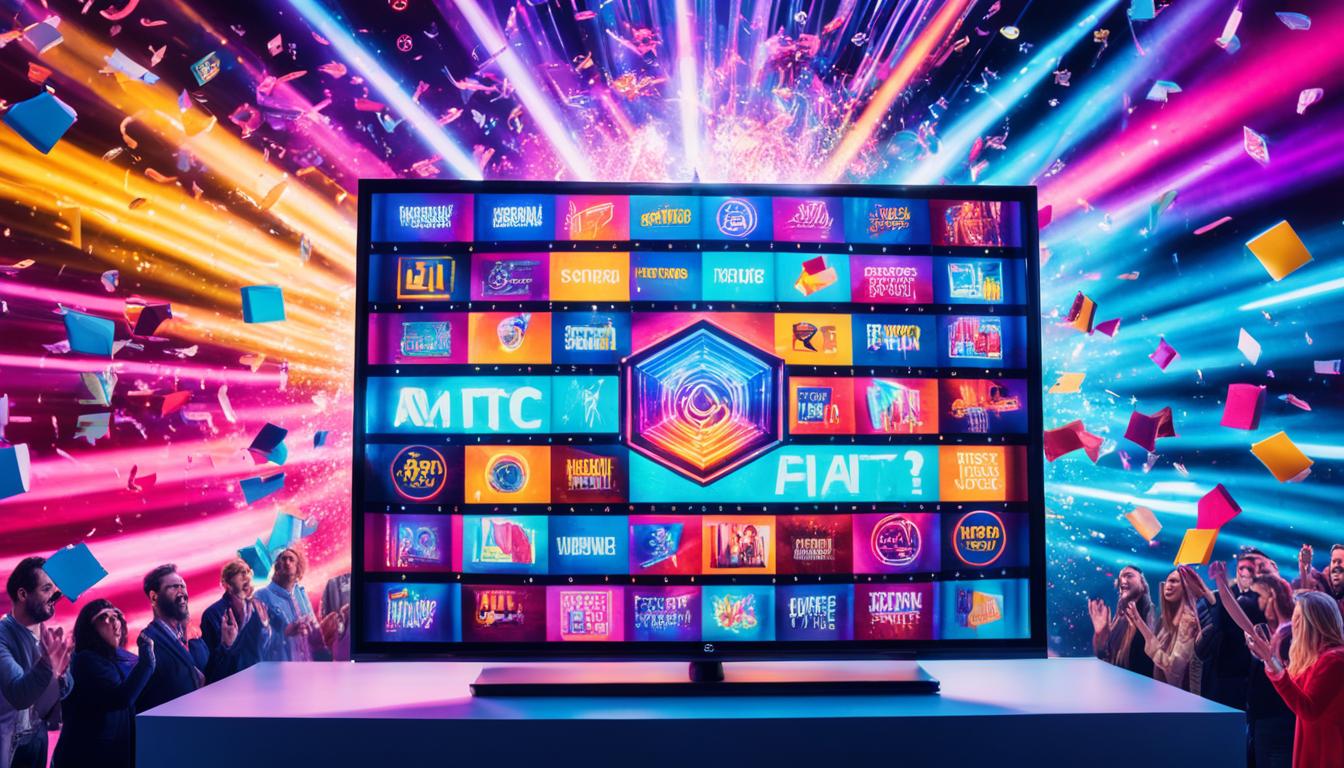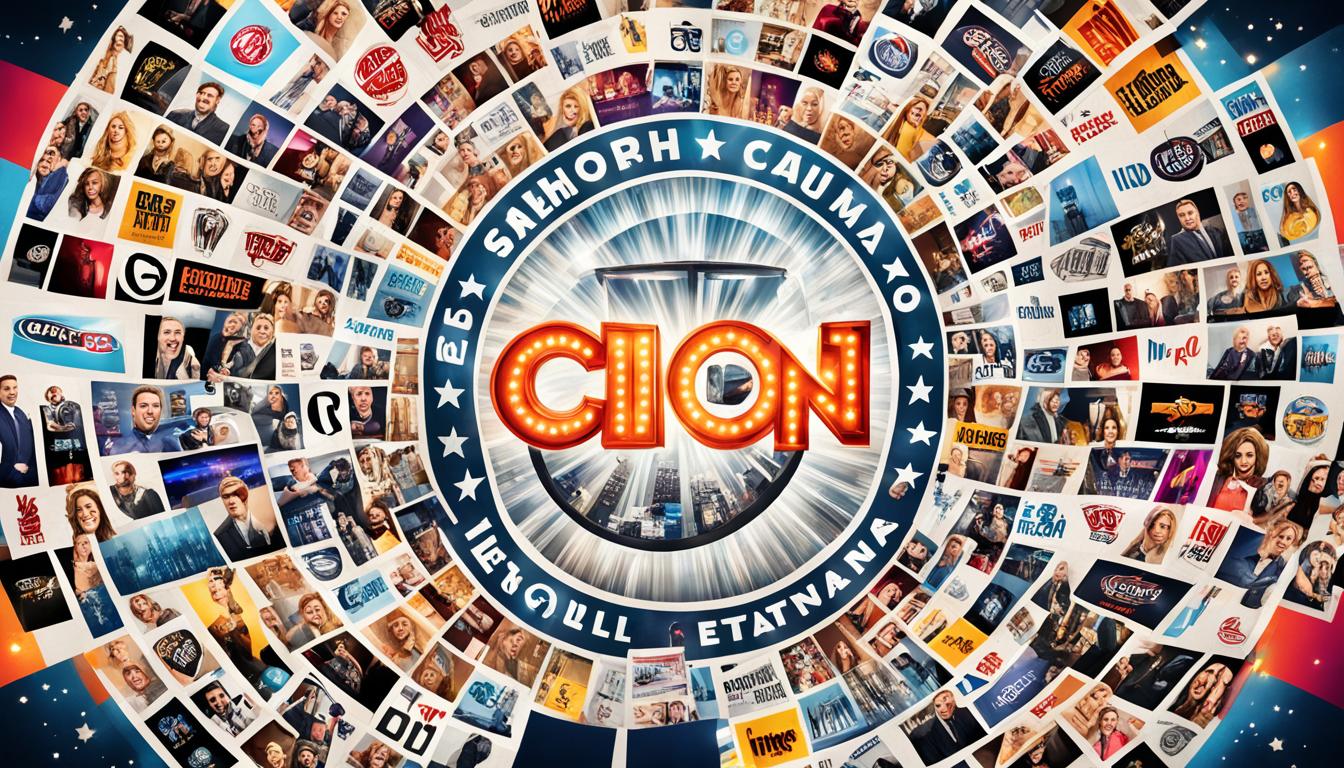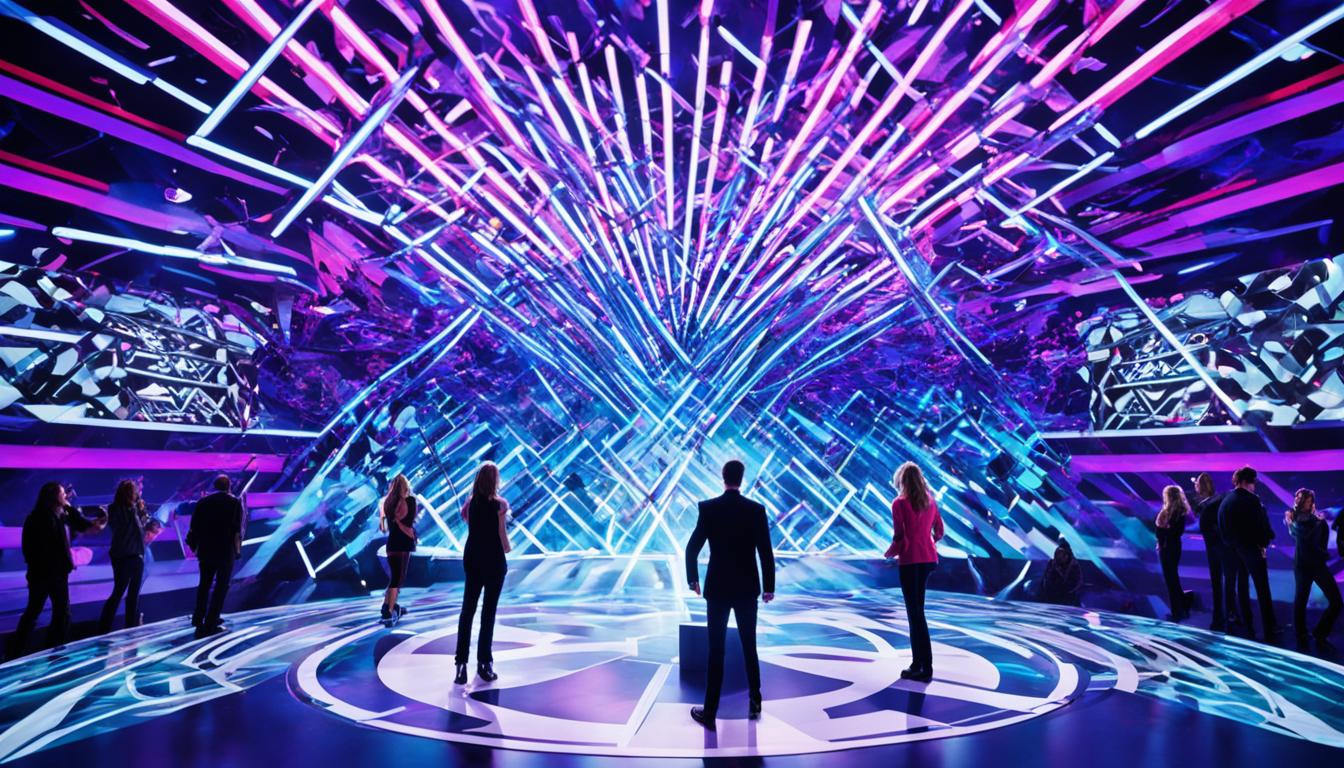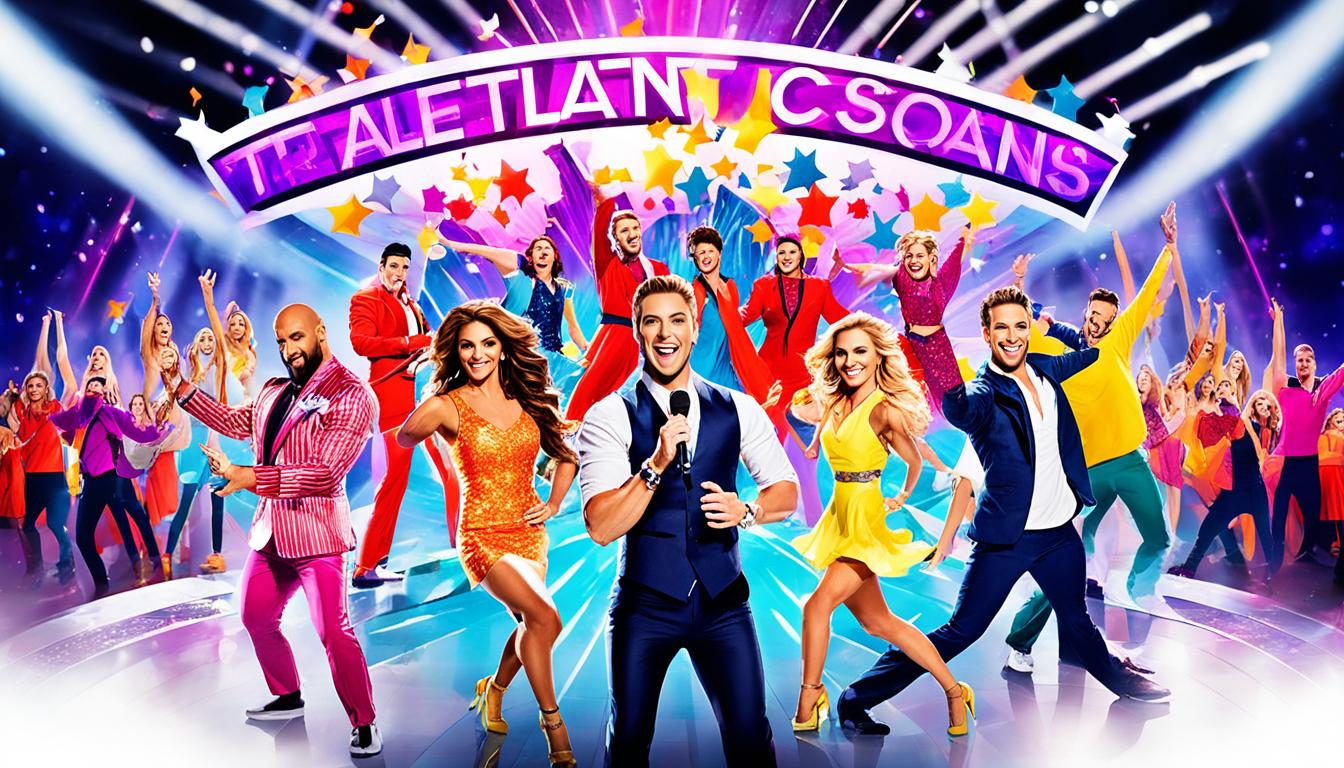In today’s television landscape, talent shows within the reality TV genre have taken the world by storm. From singing competitions to dance-offs and everything in between, these shows have become a cultural phenomenon that captivates millions of viewers. But what is it about talent shows that makes them so appealing? In this section, we will explore the growing popularity and allure of reality competition TV.
Before we dive into the statistics and viewer preferences that have contributed to the rise of talent shows, let’s take a moment to appreciate the scale of their impact. Shows like “American Idol,” “The Voice,” and “So You Think You Can Dance” have produced some of the biggest stars in the entertainment industry, launching careers and creating household names.
Part of the appeal of talent shows lies in their ability to showcase raw talent. Audiences are drawn to the journey of aspiring performers as they chase their dreams and compete for recognition. Viewers become emotionally invested in the contestants, rooting for their favorites and experiencing their victories and disappointments vicariously.
One of the reasons talent shows have gained such a massive following is their innate ability to connect with viewers. They provide a platform for individuals from all walks of life to showcase their skills and share their stories. The relatability factor is crucial, allowing audiences to see themselves in the contestants and feel a sense of connection and empathy.
Another key aspect of talent shows’ appeal is the element of competition. Viewers love the suspense and anticipation of finding out who will be crowned the winner. The ups and downs, the unexpected twists, and the fierce rivalries create a thrilling viewing experience that keeps audiences on the edge of their seats.
Join me as we unravel the tapestry of talent shows and gain insights into their cultural impact. Let’s explore the psychology behind viewer attraction, analyze case studies of major reality talent hits, and delve into the social influence and commercial viability of these shows. Together, we’ll uncover the secrets of reality competition TV and understand why it has become such a beloved genre.
Key Takeaways:
- Talent shows within the reality TV genre have become a cultural phenomenon, captivating millions of viewers.
- The appeal of talent shows lies in their ability to showcase raw talent and connect with viewers on a relatable level.
- The element of competition and the suspense of finding out who will win keeps audiences hooked.
- We will explore the psychology behind viewer attraction, analyze case studies of major reality talent hits, and uncover the social influence and commercial viability of talent shows.
- Through this exploration, we can gain a comprehensive understanding of the appeal and impact of reality competition TV.
The Resurgence of Reality TV: A Cultural Phenomenon
Reality TV has experienced a resurgence in recent years, captivating audiences and becoming a cultural phenomenon that has transformed the television landscape. The once dismissed genre has evolved into a powerhouse of entertainment, dominating prime time and engaging viewers in unprecedented ways.
The Rise of Reality Programming in Prime Time
The resurgence of reality TV can be attributed to its increasing prominence in prime time slots. Networks have recognized the appeal and profitability of reality programming, leading to an influx of shows that have secured coveted time slots traditionally reserved for scripted dramas and comedies. These prime time reality shows have consistently garnered high ratings and captured the attention of a wide range of viewers.
With their compelling storylines, unpredictable twists, and relatable characters, reality shows have become a staple of primetime television, offering viewers a diverse array of entertainment options. From talent competitions to dating shows, reality programming caters to a variety of preferences, ensuring broad audience engagement.
Viewer Preferences and Demographic Engagement
Reality TV’s resurgence can also be attributed to its ability to appeal to viewer preferences and engage specific demographic groups. The genre’s focus on real people and unscripted narratives creates a sense of authenticity that resonates with audiences. Viewers are drawn to the raw emotions, personal stories, and relatable moments that reality shows provide.
Additionally, reality TV has adapted to cater to the preferences of different demographics. Shows such as “The Bachelor” and “The Real Housewives” franchise target specific age groups and interests, ensuring a loyal and dedicated fan base. This strategic targeting has contributed to the genre’s continued success and viewer engagement.
Financial Impact and Audience Numbers
The resurgence of reality TV has not only captured the attention of viewers but has also had a significant financial impact on the television industry. The genre’s cost-effective production, compared to scripted shows, has made it an attractive option for networks. With lower production costs and higher audience numbers, reality TV offers a favorable return on investment.
Moreover, reality shows have consistently garnered impressive audience numbers, with popular series attracting millions of viewers each week. The ability to attract a large, dedicated fan base translates into higher advertising revenue and sponsorship opportunities for networks. Brands are keen to align themselves with popular reality shows, recognizing the potential for exposure to a wide and engaged audience.

| Show | Genre | Viewer Numbers |
|---|---|---|
| The Masked Singer | Talent competition | Over 10 million |
| Keeping Up with the Kardashians | Reality drama | Over 1 million |
| The Bachelorette | Reality romance | Over 5 million |
Understanding Viewer Attraction to Reality Talent Shows
Viewers are captivated by reality talent shows for a multitude of reasons. In this section, we will delve into the psychology behind viewer attraction to these shows and explore the enduring appeal they hold.
One of the key factors that draws viewers to reality talent shows is the talent showcased on these programs. Audiences are fascinated by the diverse range of skills and abilities displayed by the contestants. Whether it’s singing, dancing, cooking, or other talents, viewers are eager to witness the raw talent and potential of individuals striving to achieve their dreams.
The emotional connections formed with contestants also play a vital role in attracting viewers. As the contestants share their journeys, struggles, and triumphs, viewers develop a sense of empathy and connection with them. This emotional investment keeps viewers engaged, rooting for their favorite contestants and deeply involved in their stories.
Furthermore, the element of competition in reality talent shows enhances audience engagement. The thrill of watching contestants compete against each other, striving to outperform their rivals, creates a sense of excitement and anticipation. Viewers become invested in the outcome, eagerly awaiting each episode to discover who will emerge victorious.
Reality talent shows also tap into viewer psychology by providing a form of escape and entertainment. These shows offer a temporary respite from the viewer’s own reality, allowing them to immerse themselves in the captivating world of talent, creativity, and competition. The drama, conflicts, and unexpected twists on these shows provide a rollercoaster of emotions, keeping viewers hooked and entertained.
Understanding the factors that contribute to viewer attraction to reality talent shows provides valuable insights into the enduring popularity of this genre. By recognizing the viewer psychology and audience engagement techniques employed by these shows, we can appreciate why they continue to captivate audiences and remain a cultural phenomenon.

Analyzing Major Reality Talent Hits: Case Studies
To further understand the appeal of reality talent shows, let’s take a closer look at three major hits in this genre. These case studies will provide valuable insights into what makes these shows successful and how they have captured the attention of viewers.
The Masked Singer’s Success Story
One of the most talked-about reality talent shows in recent years is “The Masked Singer.” This unique show features celebrities singing while disguised in extravagant costumes and masks. The suspense and intrigue surrounding the masked identities of the contestants have captivated viewers worldwide.
The Masked Singer has successfully tapped into the audience’s curiosity and love for guessing games. By combining talented performances, flashy costumes, and celebrity-driven excitement, the show keeps viewers engaged week after week. The element of surprise and the big reveals have become a signature of the series, further fueling its popularity and generating buzz on social media platforms.
America’s Got Talent: A Viewer Magnet
Another major reality talent show that has consistently drawn a large audience is “America’s Got Talent.” The show’s format allows for an incredibly diverse range of talents to be showcased, including singers, dancers, magicians, and more. This variety appeals to a broad demographic, ensuring widespread popularity.
America’s Got Talent stands out for its ability to connect viewers with contestants on an emotional level. The show often covers compelling personal stories and highlights individuals overcoming obstacles to pursue their dreams. The combination of exceptional talent, heartwarming narratives, and the excitement of live performances creates a powerful viewing experience that resonates with millions of viewers.
Survivor’s Evolution and Viewership Trends
One of the longest-running reality talent shows, “Survivor,” has undergone an evolution since its debut. The show follows a group of contestants as they navigate physical and mental challenges in a remote location, competing for the ultimate prize.
Survivor’s enduring success can be attributed to its strategic gameplay, dramatic tribal councils, and the social dynamics among the contestants. The show taps into viewers’ fascination with human behavior and the desire to see how individuals navigate complex situations. Over the years, Survivor has maintained its dedicated fanbase and continues to evolve its gameplay and twists to keep viewers engaged.

| Reality Talent Show | Key Success Factors |
|---|---|
| The Masked Singer | Curiosity, celebrity factor, suspense, social media buzz |
| America’s Got Talent | Diverse talent pool, emotional connections, live performances |
| Survivor | Strategic gameplay, social dynamics, enduring fanbase |
Through these case studies, it is clear that major reality talent shows succeed by tapping into viewers’ curiosity, connecting on an emotional level, and providing engaging and thrilling content. These factors, combined with the unique qualities of each show, contribute to the enduring popularity and success of reality TV in the entertainment industry.
Reality TV’s Role in Career Launching
Reality TV has proven to be an exceptional launching pad for aspiring individuals looking to kickstart their careers. The platform provided by reality talent shows can catapult contestants into the limelight, opening doors to a myriad of industry opportunities and propelling them towards success in different fields.
One of the most notable outcomes of reality TV is the emergence of talented individuals who go on to become household names. Many talent show winners, such as Kelly Clarkson from “American Idol” and Carrie Underwood from “Nashville Star,” have achieved extraordinary success in the music industry, solidifying their positions as chart-topping artists. These individuals have leveraged their exposure gained through reality TV and used it as a stepping stone to launch their music careers.
It’s not just the music industry that has witnessed reality TV’s impact on career launching. The entertainment industry as a whole has benefited from the emergence of talented individuals from various reality talent shows. Personalities like Jennifer Hudson, who gained fame through “American Idol” and later went on to star in critically acclaimed movies, have successfully transitioned from reality TV to the silver screen, showcasing their versatility and talent.
Industry opportunities often arise for reality TV contestants, even if they don’t win the competition. The exposure gained through appearing on a popular reality show can attract the attention of industry professionals, leading to collaborations, acting opportunities, endorsements, and even their own television programs. For example, the Kardashian-Jenner family became household names after their reality show “Keeping Up with the Kardashians” debuted, opening doors to various business ventures and transforming them into influential figures in the fashion and beauty industries.

Participating in a reality talent show not only offers a platform to showcase talent but also exposes contestants to a wide range of professionals and industry connections. These connections can prove invaluable in launching successful careers in fields such as fashion, culinary arts, dance, and entrepreneurship.
Furthermore, reality TV provides a unique opportunity for contestants to demonstrate their skills, creativity, and ability to handle pressure, which are highly valued in many industries. Employers and recruiters often recognize the resilience, adaptability, and work ethic of reality TV contestants, making them attractive candidates in their respective fields.
Whether it’s through music, acting, entrepreneurship, or other creative endeavors, reality TV offers a platform for individuals to kickstart their careers and pursue their dreams. The exposure and industry opportunities that come with participating in reality talent shows can ultimately shape the trajectory of their professional lives and set them on a path towards long-term success.
The Psychological Lure of Reality Competitions
Reality competitions have a captivating charm that keeps viewers engrossed and emotionally invested in the outcomes. The quest for authenticity and raw talent is a driving force that draws audiences to reality TV shows. Viewers crave genuine performances and the opportunity to witness untapped potential. The allure lies in witnessing real people showcasing their skills, vulnerabilities, and personal journeys.
One of the key factors that contribute to the psychological lure of reality competitions is the human connection viewers feel with the contestants. These shows often feature relatable individuals from diverse backgrounds, who evoke empathy and resonate with the audience. This relatability factor goes beyond just talent and extends to personal stories, struggles, and triumphs. Viewers find themselves emotionally invested in the contestants, forming a sense of connection and rooting for the underdog.
The emotional connection viewers establish with contestants is another powerful aspect of reality competitions. The rollercoaster of emotions experienced throughout the show creates an engaging and exhilarating experience. From the anticipation of auditions and eliminations to the elation of victories and heartbreak of losses, these shows take viewers on an emotional journey. The raw, unscripted nature of reality TV allows for unfiltered displays of joy, sadness, and determination, making it a captivating form of entertainment.
In conclusion, the psychological allure of reality competitions lies in the viewers’ quest for authenticity, the relatability of the contestants, and the emotionally charged entertainment that keeps them hooked. These elements combine to create a compelling and immersive viewing experience that captivates audiences worldwide.

The Social Influence of Reality Talent Shows
Reality talent shows have become a cultural phenomenon, captivating audiences worldwide and exerting a significant social influence. These shows not only entertain viewers but also shape trends and spark conversations, reflecting and influencing societal norms and values.
“Reality TV has become a powerful force in shaping cultural conversations and reflecting societal beliefs.”
One of the key drivers of this social influence is the role of social media. With the rise of platforms like Twitter, Facebook, and Instagram, viewers now have the opportunity to engage in real-time discussions about their favorite reality shows. Social media has amplified the shared viewing experience, allowing fans to connect with each other and share their thoughts and opinions.
| Impact of Reality Talent Shows on Society | Social Media Trends |
|---|---|
| Reality talent shows serve as a mirror of society, reflecting cultural beliefs, behaviors, and values. | Social media platforms act as virtual watercoolers, enabling viewers to discuss and debate the latest episodes, contestants, and outcomes. |
| These shows contribute to national conversations on topics such as talent, success, and fame. | Viewers use hashtags and social media handles to join conversations and follow updates from contestants, judges, and the show itself. |
| Reality TV provides a window into different cultures, promoting understanding and tolerance for cultural differences. | Memorable moments and performances often go viral on social media, generating buzz and attracting even more viewers to the show. |
The social influence of reality talent shows extends beyond entertainment, making an impact on how we perceive and discuss various cultural phenomena. By understanding the broader cultural impact and the role of social media trends, we can gain insight into the significance of these shows in shaping our society.

TV Show Recaps and Reviews: Extending the Experience
TV show recaps and reviews are essential components of the viewer experience when it comes to reality talent shows. These recaps and reviews play a crucial role in extending the engagement and enjoyment that fans derive from these shows. In this section, we will explore their significance and impact on viewer perceptions and the broader cultural conversation surrounding reality TV.

The Role of Recaps and Reviews in Fan Engagement
Recaps and reviews serve as valuable resources for fans who want to delve deeper into their favorite reality talent shows. These informative pieces provide a comprehensive overview of each episode, highlighting key moments, plot developments, and dramatic twists. They allow fans to relive their favorite moments, analyze contestant performances, and speculate about future outcomes.
Furthermore, recaps and reviews foster fan engagement by creating opportunities for discussion and interaction. Fans can share their thoughts, opinions, and predictions in comment sections or on social media platforms. This active participation strengthens the sense of community and camaraderie among fans as they connect with one another over a shared passion for the show.
How Recaps and Reviews Impact Viewer Perceptions
Recaps and reviews play a significant role in shaping viewer perceptions of reality talent shows. These insightful pieces offer analysis, critique, and interpretation of the show’s content, creating a lens through which viewers can evaluate their own opinions. They provide perspectives that viewers may not have considered and help them gain a deeper understanding of the performances, judging criteria, and overall production value of the show.
Additionally, recaps and reviews can influence how viewers perceive the contestants and their journeys. They may shed light on editing techniques, behind-the-scenes information, and contextual factors that affect the portrayal of participants. These insights can shape viewers’ empathy, admiration, or skepticism towards the contestants, ultimately influencing their rooting interests and emotional investment in the show.
Top TV Show Analysis and Critic’s Perspectives
Besides fan-generated recaps and reviews, professional analysis and critic’s perspectives add another layer of depth to the conversation surrounding reality talent shows. Critics bring their expertise, industry knowledge, and keen eye for details to provide nuanced evaluations of the show’s production values, narrative arcs, and artistic merit.
Top TV show analysis and critic’s perspectives offer a broader understanding of the cultural significance and impact of reality talent shows. They may explore the societal implications, ethical considerations, and artistic innovations that arise from these shows. This critical discourse enriches the viewer experience by providing thoughtful perspectives and fostering a deeper appreciation for the genre.
By examining both fan-generated recaps and reviews and professional analysis, viewers gain a well-rounded picture of the reality talent show landscape, allowing them to form their own opinions and engage in meaningful discussions about the shows they love.
The Evolution of Viewer Engagement in Reality TV
Viewer engagement in reality TV has undergone a significant transformation over the years, fueled by the integration of interactive elements and audience participation. Today, viewers are no longer passive spectators; they play an active role in shaping the outcome of their favorite reality talent shows.
Interactive Reality TV and Audience Participation
Interactive reality TV has revolutionized the way viewers engage with their favorite shows. From live polls and quizzes to interactive challenges, these shows provide opportunities for viewers to participate in real-time, making them feel more connected to the contestants and the overall experience.
“Interactive reality TV allows viewers to feel like they are part of the action, creating a sense of ownership and investment in the show’s outcome.”
Audience participation has become a crucial aspect of reality TV, with fans taking to social media platforms to share their thoughts, predictions, and support for their favorite contestants. The ability to interact with other viewers and even the contestants themselves fosters a sense of community among fans, making the viewing experience more immersive and engaging.
Social Media: Amplifying the Shared Viewing Experience
Social media platforms have had a profound impact on the evolution of viewer engagement in reality TV. With the rise of platforms like Twitter, Instagram, and Facebook, viewers now have the ability to share their thoughts in real-time, creating a virtual watercooler effect where conversations about the show unfold simultaneously.
Contestants, networks, and even hosts actively engage with fans on social media, responding to comments and sharing exclusive behind-the-scenes content. This interactive dialogue between viewers and the show’s participants further enhances the viewing experience and creates a sense of inclusivity, fostering a dedicated and passionate fan base.
The impact of social media goes beyond just conversation. It has become a powerful tool for promoting shows, generating buzz, and driving viewership. Hashtags associated with reality talent shows often trend during live broadcasts, attracting even more viewers and fueling the social media impact of these shows.
The Impact of Live Voting and Direct Viewer Involvement
One of the most significant developments in viewer engagement is the introduction of live voting systems that allow viewers to directly influence the outcome of reality talent shows. Whether it’s through phone calls, text messages, or dedicated apps, viewers are given the power to vote for their favorite contestants and determine who advances in the competition.
Live voting not only empowers viewers, but it also creates a sense of suspense and excitement as the results unfold in real-time. This direct viewer involvement adds a layer of unpredictability and drama to the shows, making them even more captivating and compelling.
Furthermore, the integration of live voting has become a valuable tool for networks and advertisers, as it drives increased viewer engagement and generates revenue through paid voting platforms and sponsorships.
Through the evolution of viewer engagement in reality TV, we have witnessed a shift from passive viewership to active participation. With interactive elements, social media amplification, and live voting, reality talent shows have become immersive experiences that encourage viewer investment and create a sense of community. As technology continues to advance, it will be fascinating to see how viewer engagement in reality TV further evolves, transforming the genre and captivating audiences around the world.

Commercial Viability and Brand Integration in Talent Shows
Talent shows have proven to possess significant commercial viability, attracting brands and advertisers who are looking to reach a wide audience. The immense popularity and viewer engagement of talent shows present lucrative advertising opportunities for businesses. By integrating their brands into these shows, companies can tap into the captive audience and create meaningful connections with potential customers.
Brand integration plays a vital role in the financial success of talent shows. It allows brands to align themselves with the values and aspirations showcased on these programs, thereby enhancing their reputations and increasing brand visibility. By strategically integrating their products or services into the fabric of the show, brands can create lasting impressions and generate a positive association with the talent and excitement of the competition.
“Talent shows offer a unique platform for brand placement, allowing companies to showcase their offerings in a context that resonates with the audience. Through seamless integration, brands can leverage the emotional connections viewers have with the contestants, further enhancing their impact and fostering brand affinity.”
The advertising opportunities that arise from talent shows are diverse and innovative. Brands can sponsor specific segments of the show, such as performance nights or elimination episodes, ensuring their presence is prominent throughout the season. They can also collaborate with the show’s producers to create customized branded content, such as product placements or branded challenges, that seamlessly blend into the overall storyline.

Moreover, talent shows offer the possibility for live integration, where brands can engage directly with the audience through interactive elements, social media promotions, or live voting. This real-time connection allows brands to leverage the excitement and engagement of the show, creating memorable experiences for viewers and driving brand loyalty.
By understanding the commercial viability and brand integration in talent shows, businesses can unlock the vast advertising potential offered by these popular programs. Leveraging the captivating power of reality TV, brands can connect with viewers on an emotional level and position themselves as integral parts of the show’s narrative. Through strategic brand integration, businesses can maximize their reach, cultivate brand loyalty, and ultimately, drive their bottom line growth.
Reality TV: A Window into Cultural Values and Norms
Reality TV has the power to reflect and shape cultural values and norms, providing a unique lens through which we can understand societal beliefs and behaviors. These shows hold up a mirror to our society, showcasing the aspirations, desires, and even the flaws of our collective consciousness. By examining the themes and narratives portrayed in reality TV, we can gain valuable insights into the cultural fabric of our time.
Reflecting Society: How Reality Shows Shape and Mirror Cultural Beliefs
Reality TV programs often serve as reflections of our collective beliefs and ideologies. They provide a platform for individuals to express their thoughts, opinions, and actions in a public arena, presenting a microcosm of society. Whether it’s the pursuit of fame and fortune or the exploration of personal relationships, these shows offer glimpses into the values and priorities of the contestants and, by extension, the broader audience.
“Reality TV has the unique ability to reflect the cultural beliefs and values of a society. It not only captures the aspirations and dreams of individuals but also reflects the changing dynamics of social norms, relationships, and societal expectations.” – Media Analyst
Through their storytelling and editing techniques, reality shows shape the narratives and influence the perception of cultural norms. They have the power to elevate certain behaviors and attitudes, making them desirable or controversial in the eyes of the viewers. By analyzing the recurring themes and character archetypes presented in these shows, we can gain deeper insights into the cultural values they perpetuate.
Reality TV’s Contribution to National Conversations and Trends
Reality TV has become a powerful catalyst for national conversations, igniting discussions and debates on various social, cultural, and political issues. Whether it’s tackling themes of diversity, gender equality, or societal biases, these shows have the ability to bring important topics to the forefront of public discourse. By presenting real-life scenarios and challenges, reality TV invites viewers to engage in meaningful conversations about the world around them.
Social media platforms amplify the impact and reach of these conversations, as viewers actively participate in discussions, share reactions, and shape trends. The rise of hashtags, fan communities, and online forums further solidify the influence and cultural relevance of reality TV in shaping societal conversations.
The Educational Value of Reality Shows in Understanding Cultural Differences
Beyond their entertainment value, reality TV shows also offer educational opportunities by providing a glimpse into the lives and experiences of people from diverse backgrounds. These shows promote understanding and tolerance for cultural differences, helping to bridge gaps and break down stereotypes.
By showcasing contestants with various ethnicities, nationalities, and LGBTQ+ identities, reality TV exposes viewers to a range of perspectives and challenges ingrained biases. Through emotional storytelling and personal journeys, these shows offer viewers a chance to develop empathy, broaden their understanding of different cultures, and appreciate the complexity of human experiences.

Comparison of Reality TV Shows’ Cultural Impact
| Reality TV Show | Cultural Impact |
|---|---|
| The Real Housewives | Showcases the lavish lifestyles and societal expectations of affluent women, influencing fashion trends and redefining notions of femininity. |
| Queer Eye | Promotes inclusivity and acceptance through its celebration of diversity, helping to redefine societal norms around gender, sexuality, and self-care. |
| MasterChef | Brings diverse culinary traditions to the forefront, celebrating cultural heritage and promoting appreciation for international cuisines. |
| The Bachelor/Bachelorette | Shapes ideas of romance, courtship, and love, often perpetuating traditional gender roles and influencing relationship expectations. |
Through careful analysis and exploration of reality TV’s impact on cultural values and norms, we can gain a deeper understanding of the influence these shows have on society. By recognizing the power of reality TV to shape conversations, mirror cultural beliefs, and promote cultural empathy, we can engage in more meaningful and informed discussions about our ever-evolving world.
Conclusion
After exploring the diverse aspects of reality talent shows, it is clear that these shows have carved a permanent place in popular culture and television programming. The appeal of reality TV lies in its ability to captivate audiences with raw talent, emotional connections, and suspenseful competitions. Viewer attraction stems from the genuine quest for authenticity, the relatability of contestants, and the rollercoaster of emotions experienced throughout the shows.
Through case studies such as “The Masked Singer,” “America’s Got Talent,” and “Survivor,” we have gained insights into the factors that contribute to the success of major reality talent shows. These shows not only entertain but also serve as launching pads for aspiring individuals to enter various industries and pursue successful careers.
Reality talent shows reflect and shape cultural values and norms. They generate national conversations and trends that drive social influence, amplified by the power of social media. Recaps, reviews, and audience engagement further extend the viewer experience, drawing them deeper into the world of reality TV and fueling discussions.
In conclusion, reality talent shows have become an integral part of our entertainment landscape. The vast appeal, cultural impact, and evolving viewer engagement have solidified their position as a significant force in the world of television. As we unravel the tapestry of talent shows, we gain a comprehensive understanding of their enduring appeal and influence in the realm of reality competition TV.
